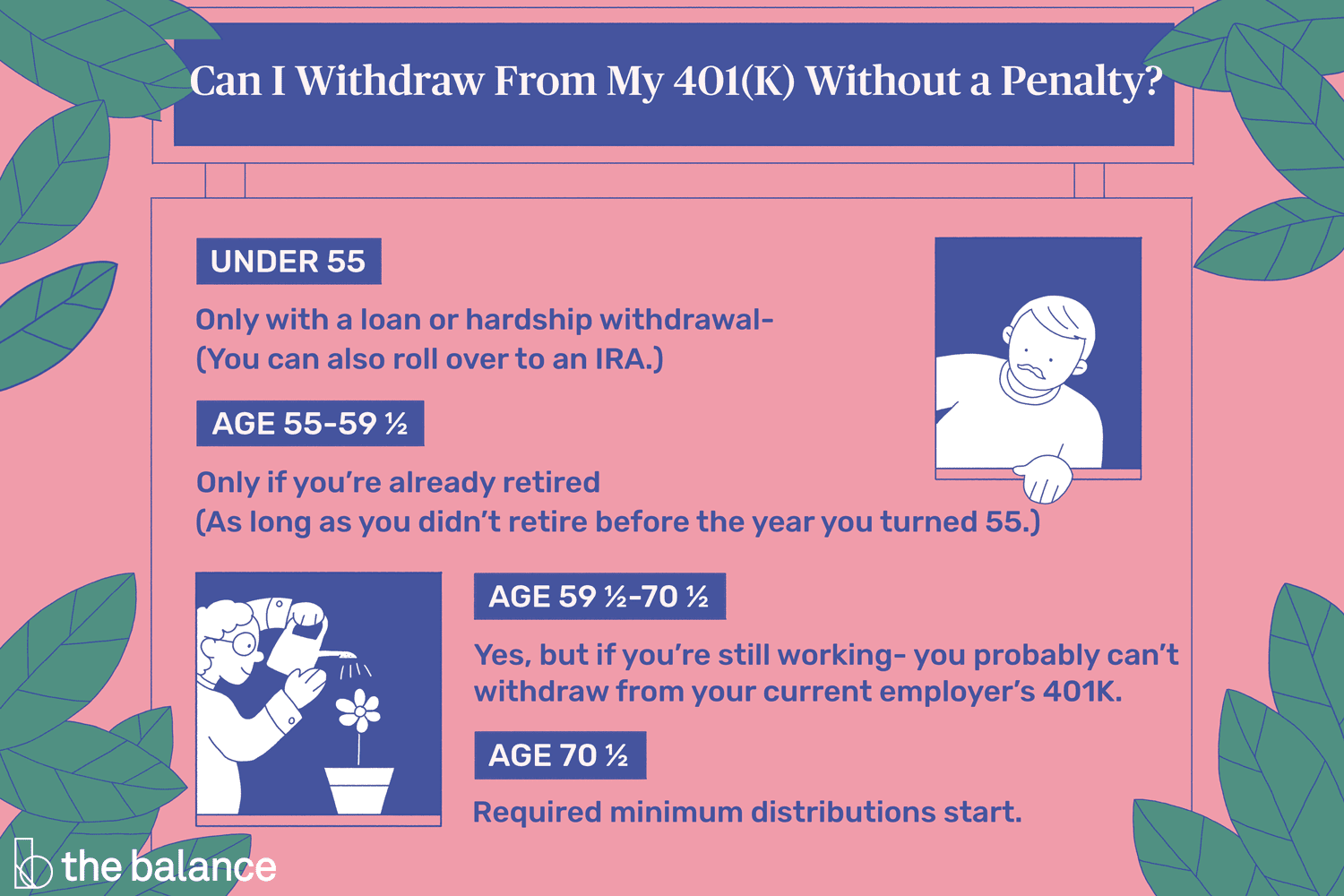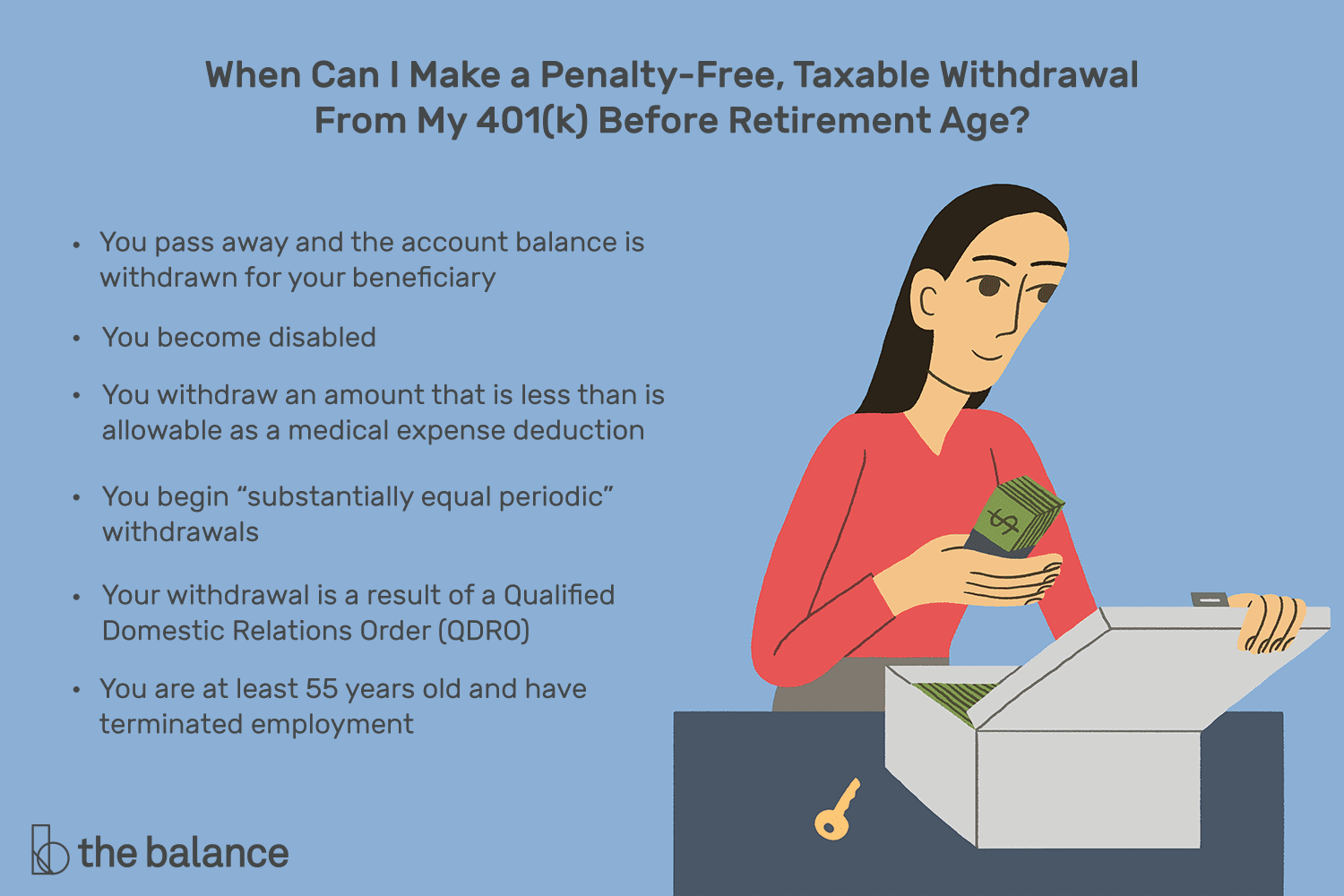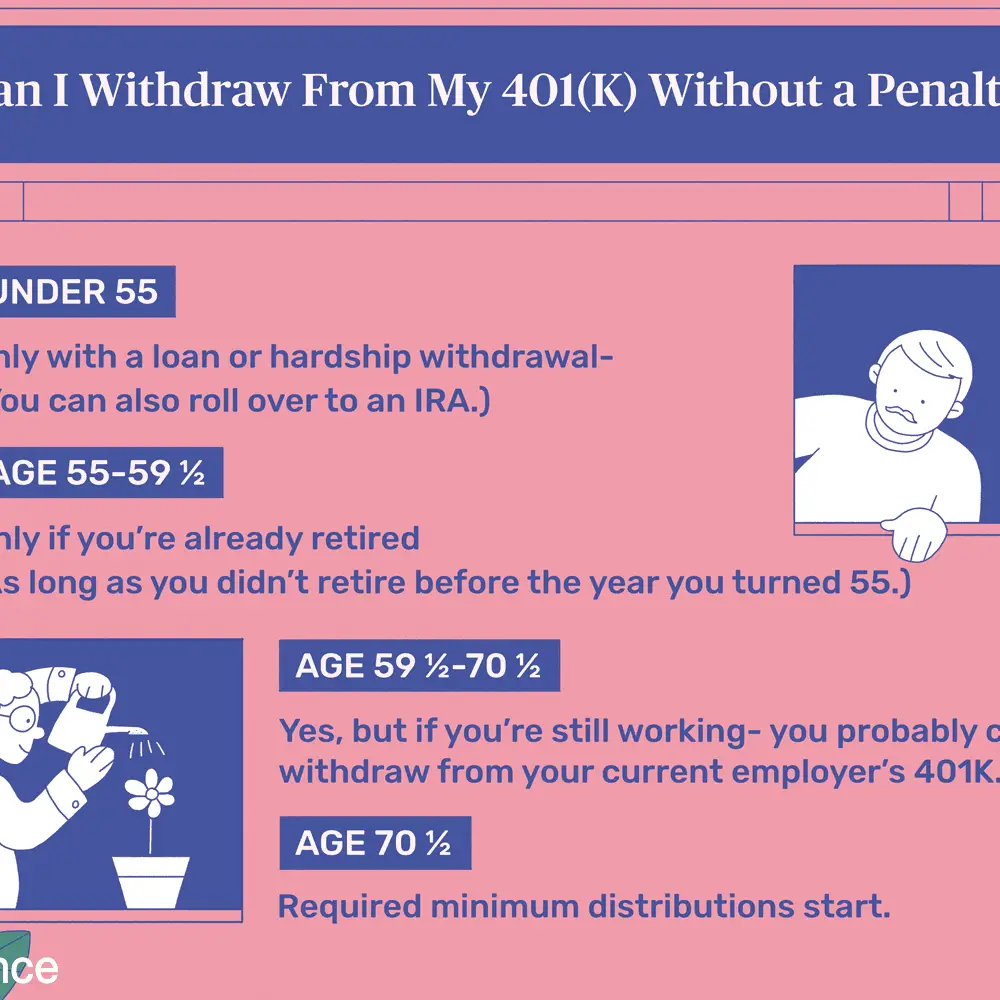What Is A 401k Cares Act Withdrawal
Normally, participants who withdraw money from a tax-deferred retirement account before reaching age 59½, must pay a 10% early withdrawal penalty in addition to including the distribution in their taxable income for the year.
There are a few exceptions to the rule, including one for hardships, such as avoiding foreclosures, repairing your home after a disaster, or covering out-of-pocket medical expenses. However, these hardship withdrawals are normally limited to the amount needed to meet a limited list of hardships.
The CARES Act provided more flexibility for making emergency withdrawals from a tax-deferred retirement account by eliminating the 10% early withdrawal penalty. Participants are allowed to withdraw up to $100,000 per person without being subject to a tax penalty. Any early withdrawals above that amount dont qualify for special tax treatment.
It is important to note that the withdrawal is taxable income the special tax treatment waives the tax penalty but not the taxable event. However, the CARES Act allows people who take hardship distributions to elect to pay federal income taxes on the distribution over a three-year period or repay the distribution amount over a three-year period and avoid tax consequences entirely. The three-year repayment period starts on the day of the distribution.
Withdrawing From A Roth 401k
Most 401k plans involve pre-tax contributions, but some allow for Roth contributions, meaning those made after taxes already have been paid.
The benefit of making a Roth contribution to your 401k plan is that you already have paid the taxes and, when you withdraw the money, there is no tax on the amount gained as long as you meet these two provisions:
- You withdraw the money at least five years after your first contribution to the Roth account
- You are older than 59 ½ or you became disabled or the money goes to someone who is the beneficiary after your death
Consider All Of Your Financial Options
When you need cash in a crunch, ideally you have options: using money saved, dipping into emergency savings, getting a loan, or possibly as a last resort withdrawing money saved for retirement. Consider the relief available if you’ve been impacted by a FEMA declared disaster , and talk to your plan sponsor and/or retirement services provider before taking any next steps.
Recommended Reading: Can I Buy Individual Stocks In My 401k
Other Options For Getting 401 Money
If you’re at least 59½, you’re permitted to withdraw funds from your 401 without penalty, whether you’re suffering from hardship or not. And account-holders of any age may, if their employer permits it, have the ability to loan money from a 401.
Most advisors do not recommend borrowing from your 401 either, in large part because such loans also threaten the nest egg you’ve accumulated for your retirement. But a loan might be worth considering in lieu of a withdrawal if you believe there’s a chance you’ll be able to repay the loan in a timely way s, that means within five years).
Loans are generally permitted for the lesser of half your 401 balance or $50,000 and must be repaid with interest, although both the principal and interest payments are made to your own retirement account. It is also worth noting that the CARES Act raises the borrowing limit from $50,000 to $100,000. If you should default on the payments, the loan converts to a withdrawal, with most of the same consequences as if it had originated as one.
401 loans must be repaid with interest in order to avoid penalties.
About two-thirds of 401s also permit non-hardship in-service withdrawals. This option, however, does not immediately provide funds for a pressing need. Rather, the withdrawal is allowed in order to transfer funds to another investment option.
Death Of Account Holder

If the account owner dies, the beneficiaries can withdraw money from 401 without the penalty of 10 percent. If the spouse inheriting a 401 account chooses to treat it as their own, the IRS will impose restrictions. In this case, withdrawing from 401 is subject to a penalty if the spouse takes a distribution before turning 59½.
Read Also: How do you avoid tax evasion?
Recommended Reading: How To Grow 401k Fast
Your Retirement Money Is Safe From Creditors
Did you know that money saved in a retirement account is safe from creditors? If you are sued by debt collectors or declare bankruptcy, your 401k and IRAs cannot be liquidated by creditors to satisfy bills you owe. If youre having problems managing your debt, its better to seek alternatives other than an early withdrawal, which will also come with a high penalty.
The Basics Of 401 Withdrawal Taxes
If you are wondering whether your 401 withdrawals are taxed, the short answer is yes your 401 distributions are likely taxable.
This may come as a surprise, because there is some confusion around how retirement accounts work. People often refer to retirement accounts like 401s as tax-advantaged, or tax-deferred. This means investments within your 401 or IRA grow tax-free. Unlike taxable investment accounts, you wont be charged income tax or capital gains tax as your 401 account grows each year.
As an example, if you earn $1,500 before taxes per paycheck, and you contribute $300 of that money to your 401, then you will only be taxed on $1,200. For reference, 401 account holders can contribute up to $19,500 in 2021 , and $26,000 for those 50 and older.
This tax advantage, however, changes once an account holder starts receiving distributions from the 401. As you pull money out, youll owe income taxes on the funds. Some 401 plans will automatically withhold 20% or so of your account to pay for taxes. Youll want to check with your plan provider to see how your particular 401 works.
Wondering when you can start cashing out? Once you reach age 59.5 you can withdraw money from your 401. If you dont need the money yet, you can wait until you reach age 72 to withdraw funds. However, once you reach 72, its no longer a choice to withdraw from your 401, its mandatory. The IRS has defined required minimum distributions for certain retirement accounts, including 401s.
Read Also: What Percentage Should I Be Putting In My 401k
Roll Money Into An Ira
If you are not satisfied with the 401 investment options, you can rollover the money into an IRA since the latter has more investment options and offers greater control. You can reallocate your portfolio of investments to help you grow your investments further in years to come.
If you have a string of old 401s when you retire, you should consolidate them into an IRA for better management of your retirement savings. Also, you can reduce the administration fees of your retirement money, and even qualify for discounts on sales charges.
How To Cash Out On A 401k Plan
Have you ever wondered if you could access the money in a 401 plan to use for other purposes before you actually retire? It is possible, but there are limitations to accessing money in any tax-qualified plan.
You see, some of the money in these plans, is really the governments money because you havent paid the taxes yet. Thus, the government wants to have a say in how you can get to the money.
Many financial advisors discourage a 401 early withdrawal because of:
- the penalties and
- the fact that you may be spending your retirement savings prematurely
Whenever you consider an early withdrawal from a 401 plan, youll want to know the cost associated, to make sure this is still a good option.
Be sure to consider your reasons carefully and clearly, rather than making a spur-of-the-moment decision. Its worth thinking twice before losing money, even if you expect to save or make more money by taking a short-term loss.
And if you think you may need money you are contributing to a 401 today, sooner than retirement, it may be a good idea to keep that money in a place that will be more accessible rather than trying to get it out of the 401 later.
OUTLINE:
You May Like: How To Rollover 401k From Empower To Fidelity
What Are The Hardship Rules For 401 Withdrawal
The rules can vary by plan, and plan participants should always consult their plan documentation to see the specific rules that will apply. Remember that even with a solo 401, you should have your rules written down and documented. However, there are a couple of basic rules that will always hold true when it comes to a hardship 401k withdrawal. First, the withdrawal must be for an immediate and heavy financial need. Next, you are only allowed to withdraw enough funds to cover that immediate need. For example, missing a mortgage payment typically does not qualify as an immediate and heavy need. However, if you have received foreclosure papers and are in danger of eviction, then that constitutes an immediate and heavy need. Again, you should contact your plan administrator with any questions about the hardship requirements for your qualified plan.
Remember Required Minimum Distributions
While you don’t need to start taking distributions from your 401 the minute you stop working, you must begin taking required minimum distributions by April 1 following the year you turn 72. Some employer-sponsored plans may allow you to defer distributions until April 1 of the year after you retire, if you retire after age 72, but it is not common. Keep in mind that this exception does not apply to plans you may have with previous employers that you no longer work for.
If you wait until you are required to take your RMDs, you must begin withdrawing regular, periodic distributions calculated based on your life expectancy and account balance. While you may withdraw more in any given year, you cannot withdraw less than your RMD.
The age for RMDs used to be 70½, but following the passage of the Setting Every Community Up For Retirement Enhancement Act in Dec. 2019, it was raised to 72.
You May Like: When Do You Need A 401k Audit
What Are The Penalties For Withdrawing From My 401 Before Age 59
Unless you fall into one of the special exemption categories, you will pay a penalty of 10% of the amount of funds you withdraw. This can get quite pricey and really cut into your retirement savings. If you must make a withdrawal before reaching retirement age, then make sure you check the list of exemptions to the penalty. If you can qualify under one of the exemptions, then you will not be forced to pay this extra penalty.
Im Dying How Do I Withdraw Money From My 401k

Hi Terry, thank you for any help you can offer. Im 62 Ill be 63 on February 3rd 2021. I have metastatic breast cancer and probably hopefully have two more years. I will probably be divorced by December 31st 2021. I have one daughter 25. I want her to get all the money I have left and not have to pay any taxes. I have in my name about $25,000 in credit card debt that is supposed to be split in the divorce. I rent. I only have about $160,000 in my job 401K, $35,000 in an IRA. Im going to apply for a three year medical leave where I have been paying for Long Term Disability w here I can get 60% of my salary which should be after taxes about $2000. monthly. How should I withdraw my money? When should I withdraw ?
You May Like: What’s The Maximum Contribution To A 401k
Retirement Savings Can Benefit
As you make loan repayments to your 401 account, they usually are allocated back into your portfolio’s investments. You will repay the account a bit more than you borrowed from it, and the difference is called “interest.” The loan produces no impact on your retirement if any lost investment earnings match the “interest” paid ini.e., earnings opportunities are offset dollar-for-dollar by interest payments.
If the interest paid exceeds any lost investment earnings, taking a 401 loan can actually increase your retirement savings progress. Keep in mind, however, that this will proportionally reduce your personal savings.
Requesting A Loan From Your 401
If you do not meet the criteria for a hardship distribution, you may still be able to borrow from your 401 before retirement, if your employer allows it. The specific terms of these loans vary among plans. However, the IRS provides some basic guidelines for loans that won’t trigger the additional 10% tax on early distributions.
Whether you can take a hardship withdrawal or a loan from your 401 is not actually up to the IRS, but to your employerthe plan sponsorand the plan administrator the plan provisions they’ve established must allow these actions and set terms for them.
For example, a loan from your traditional or Roth 401 cannot exceed the lesser of 50% of your vested account balance or $50,000. Although you may take multiple loans at different times, the $50,000 limit applies to the combined total of all outstanding loan balances.
Read Also: How Do I Cash Out My 401k Early
Using The Money For Another Purpose
Several years ago, my parents were at a time of life where they wanted to make some investments in their growing family and start a new business. These investments were not allowed within their tax-qualified plans.
They chose to withdraw money from a SEP and personal IRA, using the funds to help me and my siblings develop talents and fund our new family business. This worked out in a great way, both financially and from an experience-building perspective.
Very few financial advisors would ever have recommended my parents to do this, but to this day they are glad they made that decision.
If you believe you can make up for a 10% penalty and create more value from using the money in ways not allowed in a tax-qualified plan, then cashing out a 401 might be a good thing for you.
Be sure you have a plan of what to do with the money and how to make up for the 10% penalty if you do choose this route. And remember that not all businesses or investments are successful.
Cashing Out Your 401 After Leaving A Job
Based on the amount of money in your 401 account, your employer may allow you to leave the account with them. However, you will not be able to contribute any more to your old account.
Leaving your account with the old employer may not be prudentespecially when you have access to more flexible Individual Retirement Account plans from most brokers. You may roll over your 401 account to your new employer or transfer the funds into an IRA. If you meet the age criteria, you may start taking distributions without having to pay any penalty for early withdrawal.
You May Like: What Happens To Your 401k When You Die
When You Leave A Job
When you leave a job, you generally have the option to:
- Leave your 401 with your current employer
- Roll over the funds to an IRA
- Roll over the funds to your new employer’s 401.
If you choose any of those options, you will not owe taxes or a 10% penalty. You can also take this money as a distribution, but this will trigger early-withdrawal penalties if you are under 59 1/2 .
Withdrawing From A 401 After Leaving The Company Without A Penalty
In any of the following situations, you may qualify for early withdrawal without being subjected to any penalty:
-
If you leave a company the same year you turn 55 years old
-
If you suffer from total or permanent disability
-
If you cash out in equal installments spread over an expected period of your remaining lifetime
-
If you need to pay for medical expenses, which are more than 10% of your income
-
If as a military reservist, you have been called to active duty
Also Check: Is Rolling Over 401k To Ira Taxable
To Keep Your Living Arrangements Intact
Being at risk of eviction or foreclosure is a serious emergency for you and your family, in which case using retirement funds can be a viable option. If your landlord or mortgage lender hasn’t provided any options or assistance during this difficult time, you may consider paying your rent or mortgage with this money.
How To Make A 401 Hardship Withdrawal

InvestopediaForbes AdvisorThe Motley Fool, CredibleInsider
If you need a significant sum of money and don’t expect to have the means to repay it, one option that may be available is a hardship withdrawal from the 401 at your current employer. Without the hardship provision, withdrawals are difficult at best if you’re younger than 59½. A hardship withdrawal, though, allows funds to be withdrawn from your account to meet an immediate and heavy financial need, such as covering medical or burial expenses or avoiding foreclosure on a home.
But before you prepare to tap your retirement savings in this way, check that you’re allowed to do so. Employers don’t have to offer hardship withdrawals, or the two other ways to get money from your 401loans and non-hardship in-service withdrawals.
Also Check: How To Take Out 401k Money For House
Withdrawals After Age 72
Many people continue to work well past age 59 1/2. They delay their 401 withdrawals, allowing the assets to continue to grow tax-deferred. But the IRS requires that you begin to take withdrawals known as “required minimum distributions” by age 72.
Those who are owners of 5% or more of a business can defer taking their RMDs while they’re still working, but the plan must have made this election. This only applies to the 401 of your current employer. RMDs for all other retirement accounts still must be taken.
